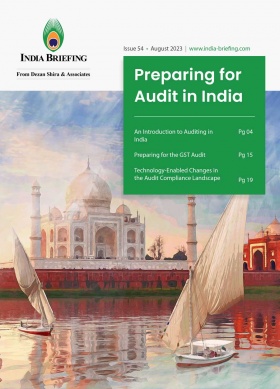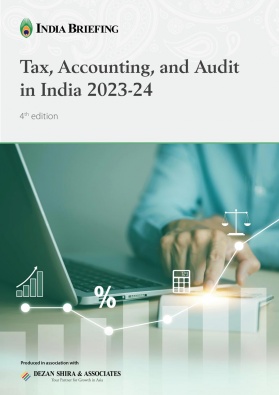Digital Services in India: Tax Applicability and Compliance
In India, services mediated by information technology over the internet or an electronic network are taxed under the GST regime. These services are officially called Online Information Database Access and Retrieval (OIDAR) services. GST is levied at 18 percent on sale of digital services in India.
Effective October 1, 2023, India has decided to terminate the GST exemption for overseas OIDAR service providers. This change will result in companies like Facebook, Google, and various edtech platforms facing an integrated GST of up to 18 percent for services rendered to individuals and the government. Previously, OIDAR services by foreign companies to the Indian government, state authorities, or individuals for non-business purposes were exempt. However, this amendment mandates taxation for all OIDAR services, regardless of their use.
As the digital economy proliferates, the taxation of services provided through the internet has caught the attention of regulators.
These internet-based services are officially known as Online Information Database Access and Retrieval (OIDAR).
They refer to the category of services provided through the medium of internet and received by the recipient online without having any physical interface with the supplier of such services.
In India, OIDAR services were first brought under the ambit of indirect taxation in 2001, under the service tax regime. In 2016, with the evolution of the digital space, the scope of these services was also broadened.
In 2017, with the introduction of the unified Goods and Services Tax (GST) regime, OIDAR services are charged under GST.
What are Online Information Database Access and Retrieval or OIDAR services?
Section 2(17) of Integrated Goods and Services (IGST) Act, 2017 defines OIDAR as services whose delivery is mediated by information technology over the internet or an electronic network and the nature of which renders their supply essentially automated involving minimal human intervention.
These include electronic services, such as advertising on the internet, providing cloud services, online supplies of digital content etc. Earlier, the definition of OIDAR included the term “minimal human intervention”.
However, in the Finance Act 2023, the scope of taxation for OIDAR services was expanded, and the definition was revised to exclude the requirement for “minimal human intervention” in service delivery.
List of OIDAR services for reference
- Website supply, webhosting, distance maintenance of programs and equipment: It includes website hosting and webpage hosting; automated, online, and distance maintenance of programs; remote systems administration; online data warehousing where specific data is stored and retrieved electronically; and online supply of on-demand disc space.
- Supply of software and updating thereof: It includes accessing or downloading software (including procurement/accountancy programs and antivirus software) plus updates; software to block banner adverts showing, otherwise known as Banner blockers; download drivers, such as software that interfaces computers with peripheral equipment (such as printers); online automated installation of filters on websites; and online automated installation of firewalls.
- Supply of images, text and information, and making available of databases: It includes accessing or downloading desktop themes; accessing or downloading photographic or pictorial images or screensavers; the digitized content of books and other electronic publications; subscription to online newspapers and journals; the provision of advertising space including banner ads on a website/web page; and use of search engines and Internet directories.
- Supply of music, films, and games, including games of chance and gambling games, and of political, cultural, artistic, sporting, scientific, and entertainment broadcasts and events: It includes accessing or downloading of films, music and games onto computers and mobile phones; accessing automated online games, which are dependent on the Internet etc.
- Supply of distance teaching: Automated distance teaching dependent on the Internet or similar electronic network to function and the supply of which requires limited or no human intervention, including virtual classrooms; and workbooks completed by pupils online and marked automatically, without human intervention.
This list of OIDAR services is not exhaustive.
How are OIDAR services taxed under GST?
The GST applicability on OIDAR services depends on the location of the recipient of the service. Under Section 13 of the IGST Act 2017, where the location of the supplier or location of the recipient is outside India – the place of supply of OIDAR services shall be the location of the recipient of services.
Thus, under this Section, any recipient of OIDAR services is deemed to be in the taxable territory – if any two of the following non-contradictory conditions are satisfied:
- Location of address presented by the recipient through internet is in taxable territory.
- Credit card or debit card or store value card or charge card or smart card or any other card by which the recipient of services settles payment has been issued in the taxable territory.
- Billing address of the recipient of services is in the taxable territory.
- Internet protocol address of the device used by the recipient of services is in the taxable territory.
- Bank of the recipient of services in which the account used for payment is maintained is in the taxable territory.
- Country code of the subscriber identity module card used by the recipient of services is of taxable territory.
- Location of the fixed land line through which the service is received by the recipient is in the taxable territory.
On September 26, 2023, the Indian government released a circular to end GST exemption enjoyed by overseas online information and database access retrieval service (OIDAR) providers. This change, which comes into effect from October 1, 2023, means that companies such as Facebook, Google, and various edtech platforms will face an integrated GST (IGST) of up to 18 percent on their services provided to both individuals and the government.
Until this recent change, OIDAR services provided by overseas companies to the Indian central government, state governments, government authorities, or individuals for non-business purposes were exempt from taxation.
GST applicability on OIDAR services
The taxability of OIDAR services is dependent on the location of the recipient and GST liability is determined accordingly:
- If both the supplier, as well as the recipient, are in India, then GST will be applicable and will be charged on the basis of forward charges.
- If the supplier is outside the taxable territory, and the recipient located in India is registered under GST, then GST will be applicable. Furthermore, payment of goods and service tax will be on reverse charge.
- If the recipient is residing in India, but is not registered under GST, and the supplier is outside the boundaries of India, then GST will be applicable, and payment for goods and service tax will be on forward charge basis. When an unregistered, non-taxable person in India imports the OIDAR services, the supplier located outside India will make the payment for such tax on forward charge.
- If both the suppliers, as well as recipients, are not located in India, then no GST will be applicable.
- If the supplier is residing in India, but the recipient is located outside the taxable territory in India, no GST will be applicable to the export service.
Who will be responsible for paying the tax?
- Recipient under reverse charge: Under this mechanism, the recipient of the service is liable for the payment of GST. Hence, all registered business entities receiving OIDAR services in India are required to pay GST when the supplier of such service is located outside India. This is mainly to protect domestic service providers.
- Supplier/Intermediary: Where OIDAR Services are provided from a non-taxable territory to a non-registered person or individual.
- Intermediary: Sometimes OIDAR products are not owned or belong to the portal or app where it is available for sale but such intermediaries are facilitating entire transaction on purchase of such software/music or other OIDAR products.
Registration process for OIDAR service providers
- OIDAR service providers located in India: OIDAR service providers located in India can obtain GST Registration through the normal procedure by applying through the GST portal.
- OIDAR service providers located outside India: All OIDAR service providers supplying services to residents in India and not located in India are also required to comply with GST regulations. Any OIDAR service provider supplying services from a location outside India to a non-taxable online recipient is required to obtain GST registration by filing GST REG-10. The application for GST Registration for OIDAR service providers can be submitted electronically with a self-attested copy of valid passport of the promoters and tax identification number or unique identification number issued by the foreign Government or PAN.
The application for GST registration must be submitted at least five days prior to the commencement of business in India.
Foreign companies can appoint a representative in India for obtaining GST registration, filing GST returns and paying GST payments on behalf of the foreign entity.
Compliances: GST returns and due dates
A GST levy of 18 percent is applicable on sale of digital services in India in both the following cases.
- OIDAR service providers located in India: They must file GSTR-1, GSTR-2, GSTR-3 and annual GST return like a regular taxpayer.
- OIDAR service providers located outside India: They are required to file Form GSTR-5A on or before the 20th of each month. They must appoint a representative in India for filing of GST returns and ensuring compliance under GST.
Form GSTR-5A is a simplified form and the details to be provided in it include:
- Details of taxable outward supplies made to consumers in India with details like place of supply (State/UT), rate of tax, taxable value, IGST, and Cess.
- Calculation of interest, penalty or any other amount.
- Tax, interest, late fee, and any other amount payable and paid.
(This article was originally published on June 14, 2021 and last updated on September 29, 2023.)
About Us
India Briefing is produced by Dezan Shira & Associates. The firm assists foreign investors throughout Asia from offices across the world, including in Delhi and Mumbai. Readers may write to india@dezshira.com for more support on doing business in India.
We also maintain offices or have alliance partners assisting foreign investors in Indonesia, Singapore, Vietnam, Philippines, Malaysia, Thailand, Italy, Germany, and the United States, in addition to practices in Bangladesh and Russia.
- Previous Article Investment Outlook for India’s Startup Ecosystem in 2023
- Next Article India’s OIDAR Taxation Shift: Key Changes Effective October 1








